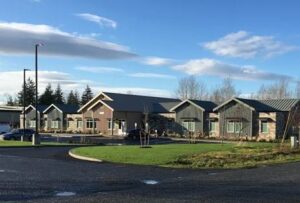Commerce invests $17.9 million in eight new behavioral health facility projects
Grants will fund the acquisition, renovation, and new construction of facilities in five counties
OLYMPIA, WA – The Washington State Department of Commerce today announced $17.9 million in grants to fund eight projects across the state that will increase services and community-based treatment options for individuals with a wide variety of behavioral health challenges.
The investments support Gov. Inslee’s five-year plan to modernize and transform Washington’s mental health system, with the goal of ending civil patient placements at the state’s two large hospitals by 2023 in favor of smaller community-based facilities.

This recently completed project serving the Whatcom County community was supported in part by an earlier Behavioral Health Facilities program grant.
Behavioral health facility grants were available in four funding categories: 90/180 day civil commitments; enhanced services facilities; peer respites, and intensive behavioral health facilities. The eight awards announced today build on $51 million invested earlier this year from funding provided by the legislature for the 2021-23 biennium.
- Benton County – $2.7 million to Aristo Healthcare Services for the Tri City Nueva Esperanza project in Kennewick.
- King County
- $1.1 million to Ajuso for the Ajuso House Peer Respite project in King County
- $2.2 million to At Home Residential for the At Home Residential Enhanced Services Facility project in King County
- Pierce County
- $2.2 million to Reliance for the Puyallup Enhanced Services Facility project in Puyallup
- $2.5 million to Emerald City Enhanced Services for the Emerald City Intensive Behavioral Health project in Gig Harbor
- $2.5 million to Reliance for the 3701 Professional Center project in Tacoma.
- Skagit County – $2.5 million to Unity Evaluation and Treatment for the Unity Intensive Behavioral Health project in Mount Vernon.
- Snohomish County – $2.2 million to #1 Heartsaved for the Heartsaved Serene Enhanced Services Facility project in Marysville.
The grants were awarded through a competitive process conducted by Commerce and our partners at the Departments of Health, Social and Health Services, and the state Health Care Authority. The funds are for construction, renovation, acquisition, and/or equipment costs associated with establishing the facilities, and the projects must maintain the facility for the intended use for at least 15 years.
To learn more about the Behavioral Health Facilities grant program, please visit the Commerce Behavioral Health Facilities program website.
